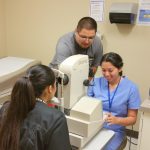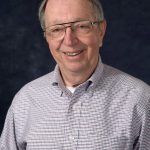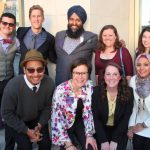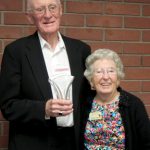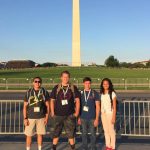Search Results for:
Clinicas de Salud del Pueblo receives telehealth award
The rural southeastern desert of Imperial County has one of the highest diagnosed rates of diabetes in California. For people suffering from the condition, one key risk is the onset of blindness. Early detection is critical. At the heart of this rural region is Clinicas de Salud del Pueblo (Clinicas), a nonprofit dedicated to providing direct access to affordable, comprehensive, quality primary and preventive health care for high-risk and underserved residents, all in a manner consistent with their dignity and identity. Until recently, screening for blindness associated with diabetes required that patients be referred to an ophthalmologist for detection, and most patients were often seen after symptoms were noticeable, which makes treatment more challenging. For some, this also meant long travel and cost to find a specialist. With support from Vesper Society, in the fall of 2015 Clinicas launched a new program in partnership with the University of California, Berkeley that uses telemedicine technology to provide access to health assessment, diagnosis, intervention, consultation, supervision and information across distance. Using a digital retinography system, a camera takes images that are sent to the specialists at the university, who in turn give a prognosis in 24 hours. Patients can have the vision screen test right there at Clinicas de Salud del Pueblo during their visit. From an average of 20 retinal screens per month in early 2015, Clinicas is now averaging 120 screens per month by using two cameras that are rotated between six clinics. Because of increased utilization, Clinicas is working with California Health and Wellness and EyePacs to obtain a third retinal camera. Key to the success of developing a thriving telehealth program is allocating sufficient dedicated staff resources to support the program. To this end, with support from Vesper Society, Clinicas hired a full-time telehealth manager in 2015.... Read More
Remembering Melvin D. George (1936-2016)
To put faith into action in the secular world and to explore the natural habitat of 17 species of penguins – Mel George persistently pursued these activities much to the admiration of his colleagues and friends. Mel was a mentor to many students throughout his academic career and found joy in the music of Mozart. Mel was active on the Vesper Society board of directors since 1999 and served as a corporate member since 2004. His keen intellect and ability to speak on a broad range of topics from a place of thoughtful observation was valued by all. Born on February 13, 1936, in Washington, D.C., Mel became active in the Evangelical Lutheran Church in America as an undergraduate at Northwestern University. There, he and his wife Meta, were first introduced to the Lutheran theologian Joseph Sittler, the man who would become his mentor and friend and whose life in ministry the couple worked tirelessly to archive for future generations. It was Sittler’s teachings that Mel turned to for inspiration during his long career as a university administrator, as president of St. Olaf College, a private Lutheran college in Minnesota, and twice as interim president of the University of Missouri. Mel took to heart Sittler’s teaching on the role of Christians in protecting the environment, something the theologian believed was a mandate from God. Mel’s fondness for penguins, a modern-day ‘canary in the mines’ for climate change, led to Mel and Meta’s travels around the world studying the mostly endangered species. Mel died on April 25, 2016, at his Columbia, Missouri home. His long-time friend Bill Bondeson said it was appropriate that Mel died on World Penguin Day. Mel was laid to rest at Holden Lutheran Church in Kenyon,... Read More
Interfaith Celebration
From the very beginning, Vesper Society saw vocation as a way to exercise one’s power in the world, putting faith into action competently and effectively for the common good. To honor that legacy, Vesper Society held an interfaith celebration at California Lutheran University as its capstone event in its 50th anniversary year. Rooted in the Lutheran tradition, Vesper Society understands we have our own faith and spiritual traditions that call us to serve. In the 21st century we need to add another layer – that of interfaith understanding and interfaith literacy – for in order to serve well in a global and local context, we must understand the traditions and values of others. At the March 12 Saturday banquet, long-time Vesper friends sat alongside recent California Lutheran University graduates to share stories about their own interfaith journeys. California Lutheran University educates leaders for a global society who are strong in character and judgment, confident in their identity and vocation, and committed to service and justice. Program speakers included Pastor Bill Harman, Professor Colleen Windham-Hughes, Interfaith Allies alumna Rebecca Cardone, and Professor Rahuldeep Gill. After viewing historic photos of the Parliament of World Religions over the years, we learned how Interfaith Allies continues to blossom. Sunday opened with an interactive interfaith prayer service “Gather Us In” organized by Pastor Melissa Maxwell-Doherty. Participants sang, read verses from different traditions, and wrote words of hope on smooth rocks that will be placed throughout the California Lutheran University campus. A procession from the prayer service led to a communal lunch hosted by Vesper Society. During a vegetarian meal, participants learned about the Sikh tradition of Langar from Professor Rahuldeep Gill. Langar expresses the ethics of sharing, community, inclusiveness, and oneness of humankind. We were delighted that the Interfaith Youth Core national conference attendees... Read More
Remembering George Spindt (1920-2016)
To make a contribution in the world: This was George Spindt’s desire across his almost 70 years of ministry. In Vesper Society, where he served as an executive and board member, he found kindred spirits who shared his ambition. Born on June 21, 1920, George grew up in Pasadena and attended Trinity Lutheran Church where he assisted the pastor with worship alongside Vesper Society cofounder Bob Cummings. In 1949, George went to Germany as director of a refugee resettlement for the Lutheran World Federation where he was immersed in the challenges of post-war Europe and the role of the church in building a new society. George returned to the U.S. in 1951 and led churches in Tucson, Arizona, and Van Nuys, California. A tragic 1957 midday plane crash on a junior high school playing field in the Southern California community of Pacoima highlighted the need for a local hospital. A group of congregations mobilized to launch Pacoima Memorial Lutheran Hospital and George served on the hospital’s board. It was this connection that led to the eventual sale of San Leandro Memorial Lutheran Hospital to Vesper Society. In 1963, George became pastor of Messiah Lutheran Church in Redwood City, California. After Pacoima Memorial purchased San Leandro Memorial, George became a point of contact for the troubled venture in Northern California. George had stayed in contact with Bob Cummings who was now in real estate development and was providing management consulting services with a mutual friend, Gene Heckathorn. After Gene and Bob founded Vesper Society in 1965, George connected them with San Leandro Memorial’s banker, and in 1966 Vesper Society took over formal management of San Leandro Memorial Hospital. Gene and Bob regarded the hospital as a laboratory for lay leaders to work out their vocation in the world. And George... Read More
Imperial Valley 4-H
At Vesper Society, we are dedicated to long-term solutions that help communities help themselves. One example of this is the University of California Cooperative Extension’s (UCCE) 4-H youth development program in Imperial County. Around the world, 4-H encourages young people and adults to volunteer. Through service learning—a teaching and learning strategy that integrates meaningful community service with instruction and reflection—members learn civic responsibility and strengthen their communities. 4-H youth who excel in leadership and community service are selected to serve the 4-H Youth Development Program as a 4-H All Star—a leader among the organization. And Imperial Valley 4-H’s five-day Team Camp Council program helps youth foster awareness and behavior change in areas related to environmental sustainability. Each day at camp, campers plan, develop, and implement projects related to land, air, energy, water, and food. In doing so, they take on the responsibilities of leadership when it comes to the environment, which is important to ensuring a healthy community. 4-H also provides leadership opportunities further from home. Last summer, four Imperial County 4-H members were selected to attend the 2015 Citizenship Washington Focus Conference in Chevy Chase, Maryland. At the conference, they had the opportunity to identify individual citizenship rights and responsibilities, identify issues facing youth and explore causes and possible solutions, and establish communication with lawmakers and witness government in action. Of particular interest to Imperial County, having the highest number of diabetics in California, local delegates worked collaboratively with San Diego State University-Calexico to initiate a healthy living workshop on diabetes for Imperial County Youth. The 4-H Study of Positive Youth Development, conducted by the Institute for Applied Research in Youth Development at Tufts University, shows youth engaged with 4-H are: Nearly two times more likely to get better grades in school Nearly two times more likely to plan... Read More

